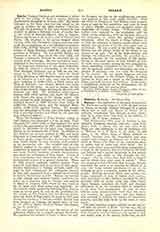

Bakócz, THOMAS, Cardinal and statesman, b. about 1442, in the village of Erdoed, county Szatmar, Northeastern Hungary; d. June 15, 1521. His family belonged to the lower class, but was raised to the rank of nobility by his older brother Valentine. Through the generosity of this same brother he was enabled to pursue a thorough course of studies first in the town of Szatmar-Nemeti, then in Cracow, Poland, and finally in the Italian cities of Ferrara and Padua. He returned to his native country about the year 1470, with the doctor’s degree, and soon after made the acquaintance of a distinguished ecclesiastic from Italy, Gabriel Rangoni, who enjoyed the confidence of King Matthias (1458-90) and held high positions in Hungary. By this prelate Bakócz was introduced to the king about the year 1474; and through a fortunate incident he attracted the attention of his sovereign. He was retained at court, employed in the chancery, and soon became secretary to the king and substitute of the royal chancellor. In 1480 he received a provostship in the town of Titel, Southern Hungary; and in 1486 he was promoted to the Bishopric of Raab. After the death of King Matthias in 1490 Bakócz took an active part in the selection of a new ruler; and when his candidate, Ladislaus II (1490-1516), a Polish prince and King of Bohemia, was chosen, Bakócz was made chancellor of the realm. As such he became the real ruler of his country, whose destinies he directed with firmness and skill. He concluded advantageous treaties with other powers, and made the alliance with Venice the pivot of his foreign policy. On that account he kept Hungary out of the League of Cambrai formed in 1508 between Pope Julius II (1503-13), France, Spain, and the Emperor Maximilian (1493-1519) against Venice. No wonder that the authorities of Venice vied with King Ladislaus in securing honors and riches for the powerful and ambitious prelate.
When the Bishopric of Erlau became vacant in 1491, Bakócz was appointed to it by the king. Pope Alexander VI (1492-1503) at first opposed, but later ratified, the appointment in 1497; and shortly afterwards, in December of the same year, transferred Bakócz to the primatial See of Gran. In addition to this Bakócz was created cardinal in 1500, and made Patriarch of Constantinople in 1507. The republic of Venice gladly assigned to him the revenues which were found within its own territory and attached to the patriarchal title. Not satisfied with all this Bakócz aspired to the papal throne, and received assurances of support from the Emperor Maximilian and from Venice; however, adverse circumstances prevented the realization of these hopes. A man of such prominence had necessarily his part in the ecclesiastical events of a general character. When in 1510 several cardinals rebelled against Pope Julius II, both sides tried to win him for their plans. Bakócz maintained a waiting attitude, until the pope, in 1511, condemned the schismatic Council of Pisa and announced that a general synod would be held in the Lateran in 1512. Bakócz was invited to this council, and without further hesitation he sailed on a Venetian ship to Ancona, and arrived in Rome in January, 1512, where he was received by the pope with much pomp and splendor. In the council, which opened the following May, Bakócz took an active part; he was on the committee for the reform of the Church and the Roman Curia. After the death of Pope Julius II, early in 1513, and during the conclave, it became evident that he had little prospect of winning the papal tiara; in fact on the 10th of March Cardinal Medici was chosen as Leo X (1513-21).
The new pope secured at once the service of the influential Bakócz for a crusade against the Turks. He appointed the primate a legate a latere not only for Hungary but also for the neighboring countries, and granted to him most ample faculties. After his return to Hungary in 1514 Bakócz made preparations at once for the expedition, and soon an army of about 100,000 soldiers was gathered under the leadership of George Dózsa. Unfortunately the nobles were opposed to the enterprise, and the whole matter ended in a civil war between them and the Crusaders, in which the nobility remained victorious. After the death of King Ladislaus II in 1516 the influence of Bakócz ceased almost completely; the last years of his life were spent more in retirement. He was a man of the world, very ambitious, and not always tender in the choice of the means to an end. Out of his large fortune, and through his influential position, he provided in a princely manner for the members of his family. Owing to the great power so long wielded by him, he made many enemies among his own countrymen, whose opposition triumphed in the end. With all that his personal conduct was blameless; not even a shadow of suspicion was cast upon his character by his enemies. He was deeply religious, and had a special devotion to the Blessed Virgin, in whose honor he fitted out a chapel in the Cathedral of Erlau, and built one near that of Gran. In the latter, a magnificent structure of the Renaissance, his remains found their last resting place.
FRANCIS J. SCHAEFER

